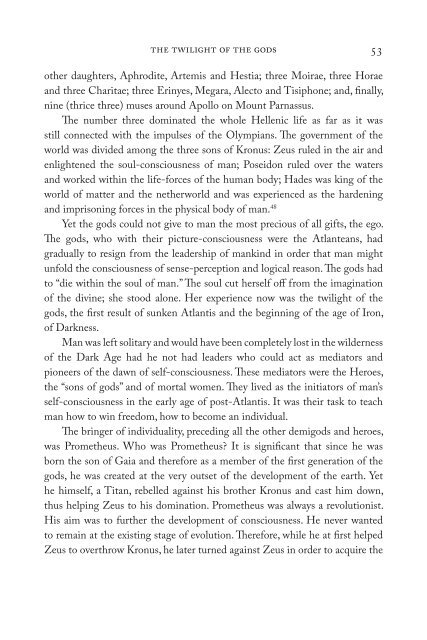The Gospel of Hellas - Research Institute for Waldorf Education
The Gospel of Hellas - Research Institute for Waldorf Education
The Gospel of Hellas - Research Institute for Waldorf Education
You also want an ePaper? Increase the reach of your titles
YUMPU automatically turns print PDFs into web optimized ePapers that Google loves.
the twilight <strong>of</strong> the gods<br />
other daughters, Aphrodite, Artemis and Hestia; three Moirae, three Horae<br />
and three Charitae; three Erinyes, Megara, Alecto and Tisiphone; and, finally,<br />
nine (thrice three) muses around Apollo on Mount Parnassus.<br />
<strong>The</strong> number three dominated the whole Hellenic life as far as it was<br />
still connected with the impulses <strong>of</strong> the Olympians. <strong>The</strong> government <strong>of</strong> the<br />
world was divided among the three sons <strong>of</strong> Kronus: Zeus ruled in the air and<br />
enlightened the soul-consciousness <strong>of</strong> man; Poseidon ruled over the waters<br />
and worked within the life-<strong>for</strong>ces <strong>of</strong> the human body; Hades was king <strong>of</strong> the<br />
world <strong>of</strong> matter and the netherworld and was experienced as the hardening<br />
and imprisoning <strong>for</strong>ces in the physical body <strong>of</strong> man. 48<br />
Yet the gods could not give to man the most precious <strong>of</strong> all gifts, the ego.<br />
<strong>The</strong> gods, who with their picture-consciousness were the Atlanteans, had<br />
gradually to resign from the leadership <strong>of</strong> mankind in order that man might<br />
unfold the consciousness <strong>of</strong> sense-perception and logical reason. <strong>The</strong> gods had<br />
to “die within the soul <strong>of</strong> man.” <strong>The</strong> soul cut herself <strong>of</strong>f from the imagination<br />
<strong>of</strong> the divine; she stood alone. Her experience now was the twilight <strong>of</strong> the<br />
gods, the first result <strong>of</strong> sunken Atlantis and the beginning <strong>of</strong> the age <strong>of</strong> Iron,<br />
<strong>of</strong> Darkness.<br />
Man was left solitary and would have been completely lost in the wilderness<br />
<strong>of</strong> the Dark Age had he not had leaders who could act as mediators and<br />
pioneers <strong>of</strong> the dawn <strong>of</strong> self-consciousness. <strong>The</strong>se mediators were the Heroes,<br />
the “sons <strong>of</strong> gods” and <strong>of</strong> mortal women. <strong>The</strong>y lived as the initiators <strong>of</strong> man’s<br />
self-consciousness in the early age <strong>of</strong> post-Atlantis. It was their task to teach<br />
man how to win freedom, how to become an individual.<br />
<strong>The</strong> bringer <strong>of</strong> individuality, preceding all the other demigods and heroes,<br />
was Prometheus. Who was Prometheus? It is significant that since he was<br />
born the son <strong>of</strong> Gaia and there<strong>for</strong>e as a member <strong>of</strong> the first generation <strong>of</strong> the<br />
gods, he was created at the very outset <strong>of</strong> the development <strong>of</strong> the earth. Yet<br />
he himself, a Titan, rebelled against his brother Kronus and cast him down,<br />
thus helping Zeus to his domination. Prometheus was always a revolutionist.<br />
His aim was to further the development <strong>of</strong> consciousness. He never wanted<br />
to remain at the existing stage <strong>of</strong> evolution. <strong>The</strong>re<strong>for</strong>e, while he at first helped<br />
Zeus to overthrow Kronus, he later turned against Zeus in order to acquire the

















